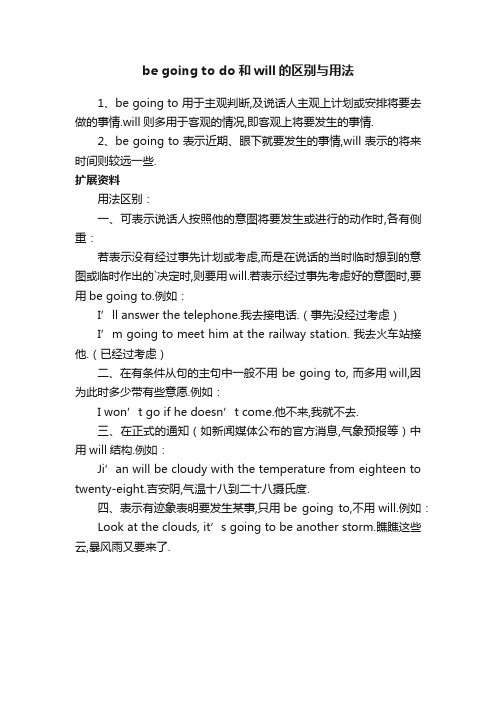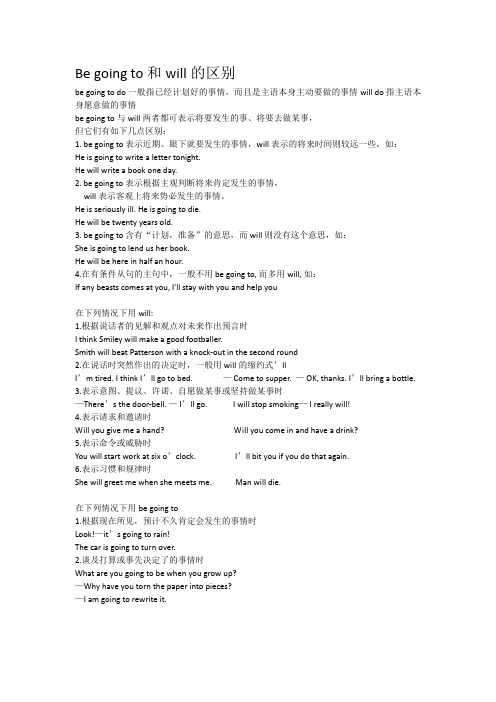be going to和will的区别
begoingtodo和will的区别与用法

be going to do和will的区别与用法
1、be going to 用于主观判断,及说话人主观上计划或安排将要去做的事情.will则多用于客观的情况,即客观上将要发生的事情.
2、be going to 表示近期、眼下就要发生的事情,will 表示的将来时间则较远一些.
扩展资料
用法区别:
一、可表示说话人按照他的意图将要发生或进行的动作时,各有侧重:
若表示没有经过事先计划或考虑,而是在说话的当时临时想到的意图或临时作出的`决定时,则要用will.若表示经过事先考虑好的意图时,要用be going to.例如:
I’ll answer the telephone.我去接电话.(事先没经过考虑)
I’m going to meet him at the railway station. 我去火车站接他.(已经过考虑)
二、在有条件从句的主句中一般不用 be going to, 而多用will,因为此时多少带有些意愿.例如:
I won’t go if he doesn’t come.他不来,我就不去.
三、在正式的通知(如新闻媒体公布的官方消息,气象预报等)中用will结构.例如:
Ji’an will be cloudy with the temperature from eighteen to twenty-eight.吉安阴,气温十八到二十八摄氏度.
四、表示有迹象表明要发生某事,只用be going to,不用will.例如:
Look at the clouds, it’s going to be another storm.瞧瞧这些云,暴风雨又要来了.。
will和be going to的区别

will 和 be going to
4.在有条件从句的主句中,一般不用 be going to, 而多用will。
If the rain stops, the match will begin. 如果雨停了,比赛就会开始了。 If you have any difficulties, I will help you. 如果你有任何困难,我会帮助你。
will 和 be going to
2. be going to 表示根据主观判断将来肯定发生 的事情,will表示客观上将来势必发生的事情。 He is seriously ill. He is going to die. 他病得很严重,马上就要死了。 He will be twenty years old. 他马上就要20岁了。
will 和 be going to
will 和 be going to都可以用来表示将来,但 是用法有区近期、眼下就要发生的事情, will 表示的将来时间则较远一些。 He is going to write a letter tonight. 他今晚将要写一封信。 He will write a book one day. 他将来有一天要写一本书。
will 和 be going to
3. be going to 含有“计划,准备”的意思, 而 will 表示单纯的将来。
She is going to lend us her book. 她准备把她的书借给我们。 He will be here in half an hour. 他半个小时后会在那儿。
be going to和will的区别

b e?g o i n g?t o与w i l l的区别?be?going?to与will两者都可表示将要发生的事、将要去做某事,但它们有如下几点区别:?1.?be?going?to?表示近期、眼下就要发生的事情,will?表示的将来时间则较远一些,如:?? He?is?going?to?write?a?letter?tonight.??He?will?write?a?book?one?day.??2.?be?going?to?表示根据主观判断将来肯定发生的事情,will表示客观上将来势必发生的事情。
??He?is?seriously?ill.?He?is?going?to?die.??He?will?be?twenty?years?old.??3.?be?going?to含有“计划,准备”的意思,而will则没有这个意思,如:??She?is?going?to?lend?us?her?book.??He?will?be?here?in?half?an?hour.??4.在有条件从句的主句中,一般不用?be?going?to,?而多用will,?如:??If?any?beasts?come?at?you,?I'll?stay?with?you?and?help?you?will和be?going?to的选用原则???1.?关于“打算”??原先作好的打算用“be?going?to”。
??“Kate?is?in?hospital.”?“Yes,?I?know.?I?am?going?to?see?her?this?afternoon.”??“凯特在住院。
”“是的,我知道。
我下午要去看她。
”??说话时即时的打算用“will”。
??“Kate?is?in?hospital.”?“Oh,?really,?I?didn’t?know.?I?will?go?and?see?her?at?once.”??“凯特在住院。
be going to 和will 的区别

4.There
________ a basketball match between Class 1 and Class 3 tomorrow. A.is going to B.is going to be C.is going to have D.are going to be 5.—I don't know your e-mail address. Could you please ________ here? —Sure. A.write down it B.write it down C. take it up D.take up it
13.—Daniel,
D.watch
could you tell me________?
—Certainly, in Japan. A.when the 2020 Olympics will be held B.when will the 2020 Olympics be held C.where the 2020 Olympics will be held D.where will the 2020 Olympics be held
1. be going to 表示近期、眼下就要发生的事情; will表示 将来的时间较远一些。
He
is going to write a letter tonight. He will write a book one day. 2. be going to 表示根据主观判断将来肯定发生的事情; will表示客观上将来势必发生的事情。
D.how long will Dad come back
12.—Have
you watched the new movie Kung Fu Panda 3,
Will 和 be going to 结构的区别

Will 和be going to 结构的区别一、两者均可用来表示将来的意图,但"be going to"结构语义稍强些。
例如:They are going to climb the Qomolangma one day.他们准备/想将来某一天去爬珠穆朗玛峰。
二、对于事先经过考虑的打算、计划、意图, 应使用be going to, 而不是will 结构。
例如:— What are you going to do next Sunday?下星期天你打算干什么?— I'm going to go fishing. 我打算去钓鱼。
三、对于未经过考虑的打算,计划,只是临时之意,则用will 结构,不用be going to 结构。
例如:— Where is the telephone book? 电话号码簿在哪儿?— I'll go and get it for you. 我去给你拿。
四、在表示即将发生某事时,两者区别意义不大,多可互换。
例如:What is going to happen? 就要发生什么事?What will happen? 将要发生什么事?一般说来,be going to 表示较近的将来,而will 则表示较远的将来。
试比较:It is going to snow tonight. 今晚要下雪。
There will be a strong wind in a few days. 几天后将有一场大风。
五、表示不受人的主观意愿影响的单纯将来,一般只能用will结构。
例如:Tomorrow will be April Fools' Day. 明天是愚人节。
六、在正式的通知(如新闻媒体公布的官方消息,气象预报等)中用will结构。
例如:There will be a heavy rain to the south of Huai River.淮河以南将有大雨。
Be going to 和will 将来时的几种表达方式

Be going to 和will的区别be going to do 一般指已经计划好的事情,而且是主语本身主动要做的事情 will do 指主语本身愿意做的事情be going to与will两者都可表示将要发生的事、将要去做某事,但它们有如下几点区别:1. be going to 表示近期、眼下就要发生的事情,will 表示的将来时间则较远一些,如:He is going to write a letter tonight.He will write a book one day.2. be going to 表示根据主观判断将来肯定发生的事情,will表示客观上将来势必发生的事情。
He is seriously ill. He is going to die.He will be twenty years old.3. be going to 含有“计划,准备”的意思,而 will 则没有这个意思,如:She is going to lend us her book.He will be here in half an hour.4.在有条件从句的主句中,一般不用 be going to, 而多用will, 如:If any beasts comes at you, I'll stay with you and help you在下列情况下用will:1.根据说话者的见解和观点对未来作出预言时I think Smiley will make a good footballer.Smith will beat Patterson with a knock-out in the second round2.在说话时突然作出的决定时,一般用will的缩约式’llI’m tired. I think I’ll go to bed. — Come to supper. — OK, thanks. I’ll bring a bottle.3.表示意图、提议、许诺、自愿做某事或坚持做某事时—There’s the door-bell. — I’ll go. I will stop smoking— I really will!4.表示请求和邀请时Will you give me a hand? Will you come in and have a drink?5.表示命令或威胁时You will start work at six o’clock. I’ll bit you if you do that again.6.表示习惯和规律时She will greet me when she meets me. Man will die.在下列情况下用be going to1.根据现在所见,预计不久肯定会发生的事情时Look!—it’s going to rain!The car is going to turn over.2.谈及打算或事先决定了的事情时What are you going to be when you grow up?—Why have you torn the paper into pieces?—I am going to rewrite it.将来时的六种表示方法:be going to do 将会... 一般用于将来时态1. I am assuming that the present situation is going to continue.我认为目前的情况将会继续下去.2. It's going to cost 200 or as near as dammit. 这要花200英镑上下.3. How did you find out that Burns was going to be promoted?你是怎么知道伯恩斯将会得到提升的?4. You must be out of your mind if you think I'm going to lend you 50!你以为我会借给你50英镑, 你准是疯了!5. I'm just going to check in these books at the library. 我要去图书馆还这些书。
will和be going to的区别

Be going to 结构和will的比较 1,一般情况下will 可以和be going to 互换。 Be going to 表示打算,意图。 We are going to /will meet in the park at 5 pm. 2.以下情况多用will而不用be going to 侧重于说话人相信或希望要发生某事,可指 遥远的将来 I believe he will become a famous actor. 陈述自然规律,表示单纯的将来事实 This year she is 17 and next year she’ll be 18 带有主观意愿色彩。 If you like,I’ll do it for you .如果你喜欢,我会 为你做那件事的
be_going_to__与will的用法及区别

B. will going to be
D. will go to be B. doesn’t working D. won’t work
2. Charlie ________ here next month.
3. He ________ very busy this week, he ________ free next week. A. will be; is C. will be; will be B. is; is D. is; will be
4. There ________ a dolphin show in the zoo tomorrow evening.
e.g. 天气很冷,我为你泡杯热咖啡吧。 It is very cold , I will make you some hot coffee.
will和be going to的选用原则
一、“打算” 1.原先作好的打算用“be going to”。 “Kate is in hospital.” “Yes, I know. I am going to see her this afternoon.” “凯特在住院。”“是的,我知道。我下午要去看她。” 2.说话时即时的打算用“will”。 “Kate is in hospital.” “Oh, really, I didn’t know. I wi ll go and see her at once.” “凯特在住院。”“哦,是吗?我都不知道呢。我得马上 去看她。”
3.当动词表示内心活动时,表示 猜测的句子必须用“will” 我想她会喜欢我为她做的蛋糕。 I think she will like the cake I made f or her.
- 1、下载文档前请自行甄别文档内容的完整性,平台不提供额外的编辑、内容补充、找答案等附加服务。
- 2、"仅部分预览"的文档,不可在线预览部分如存在完整性等问题,可反馈申请退款(可完整预览的文档不适用该条件!)。
- 3、如文档侵犯您的权益,请联系客服反馈,我们会尽快为您处理(人工客服工作时间:9:00-18:30)。
be going to与will的区别
be going to与will两者都可表示将要发生的事、将要去做某事,但它们有如下几点区别:1. be going to 表示近期、眼下就要发生的事情,will 表示的将来时间则较远一些,如:
He is going to write a letter tonight. He will write a book one day.
2. be going to 表示根据主观判断将来肯定发生的事情,will表示客观上将来势必发生的事情。
He is seriously ill. He is going to die. He will be twenty years old.
3. be going to含有“计划,准备”的意思,而will则没有这个意思,如: She is going to lend us her book. He will be here in half an hour.
4.在有条件从句的主句中,一般不用 be going to, 而多用will, 如: If any beasts come at you, I'll stay with you and help you
will和be going to的选用原则
1. 关于“打算”
原先作好的打算用“be going to”。
“Kate is in hospital.”“Yes, I know. I am going to see her this afternoon.”“凯特在住院。
”“是的,我知道。
我下午要去看她。
”
说话时即时的打算用“will”。
“Kate is in hospital.”“Oh, really, I didn’t know. I will go and see her at once.”“凯特在住院。
”“哦,是吗?我都不知道呢。
我得马上去看她。
”
2. 关于“预料”
在有迹象表明的情况下的预料用“be going to”
Look at the clouds. It’s going to rain. 你看天上的云。
快下雨了。
My God! We are going to crash. 天哪!我们快撞车了。
在没有迹象表明的情况下进行的猜测用“will,be going to”皆可。
I think the weather will be nice. I think the weather is going to be nice. 我想天会晴朗。
Do you think the car will start? Do you think the car is going to start? 你想车能发动起来吗?
当动词表示内心活动时,表示猜测的句子必须用“will” I think she will like the cake I made for her. 我想她会喜欢我为她做的蛋糕。
"be going to"中的be是助动词,它有am, is, are三种形式,没有什么实际意义;to是动词不定式的标志词,标志词后动词用原形。
它们三个总是形影不离,在句中共同表达"计划、打算、准备去做……"的意思。
如:
I am going to sell this old car, and buy a new one. 我打算卖掉这辆旧车,然后买辆新车。
现在进行时be doing表示将来
现在进行时可用来表示一个在最近按计划或打算要进行的动作;通常带一个表将来的时间状语, 但有明确的上下文时无须指出时间。
能用进行时表将来的动词:并非所有动词
go, come, leave, start, arrive, give, return, sleep ,stay, play, do, take, get, see off, travel, fly, drive, walk, reach, meet…等常见的部分表位移的非延续性行为动词
1)come, go, stay, arrive, leave 等趋向动词的现在进行时经常用于表示将来确切的计划。
eg:I am leaving here next Tuesday.
My sister is staying here for three months.
2) 表示交通方式、行程安排的动词,例如fly, walk, ride, drive, take (a bus, a taxi)等的现在进行时也经常用于表示将来。
eg:I am flying to Shanghai tomorrow
现在进行时表示现在和将来的区别
1、现在进行时表示现在,其时间状语为表示具体时刻的句子(it’s sever o’clock 等)或词语(now等),有时候也使用祈使句或listen,look等提示词来标志时间。
eg:Be quite!The baby is sleeping.
She is doing her homework now.
It’s six o’clock in the evening. The Greens are having their supper.
2、现在进行时表示将来,其后所跟时间状语必须是表示将来的时间
eg:I’m going shopping tomorrow.
Jim is visiting his friend in America next week.
表示将来的动作或状态,还可用:
①will / shall+动词原形: 不以主观意志为转移的,客观的。
I shall be seventeen years old next month.
Tomorrow will be Sunday.
②be going to+动词原形:表示即将发生的或最近打算进行的事。
We are going to have a meeting today.
It seems to be going to rain.
③be to+动词原形:表示按计划要发生的事或征求对方意见,事先安排好的。
Are we to go on with this work?
They are to get married next month.
用法篇
"be going to"必须与表示将来的时间信息词如this afternoon, tomorrow, the day
after tomorrow以及next系列时间短语等连用。
它可表示: 1.事先经过考虑、安排近期要做的事情。
如:
They are going to the park this weekend. 他们打算这周末去公园。
2.根据目前某种迹象判断某事非常有可能发生。
如:
What bad weather! It is going to snow tomorrow. 多糟的天气!看来明天要下雪。
另外
1. "be going to"的肯定式是"主语 + be going to + do(动词原形) + ..."。
上面的例句中就有肯定句,再仔细看看吧!
2. "be going to"的否定式是在助动词be后加not,即:主语 + be + not + going to + do +... 如: Peter is not going to make a model ship. 彼得不打算做一个轮船模型。
3. "be going to"的疑问式是把助动词be移到句首,即:Be+主语+going to do+...?这和be作联系动词时的用法相似。
如:
Are you going to mend his chair soon? Yes, I am. / No, I'm not. 你打算马上给他修椅子吗?是的,马上修。
/不,没这个想法。
